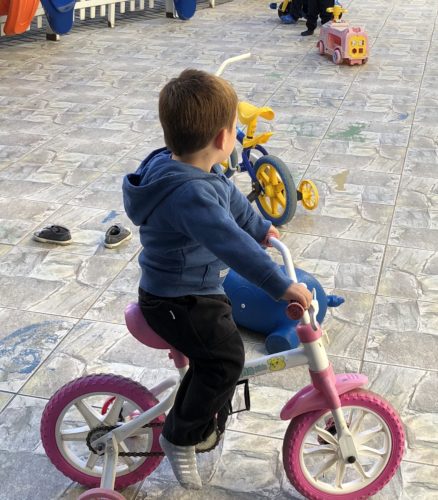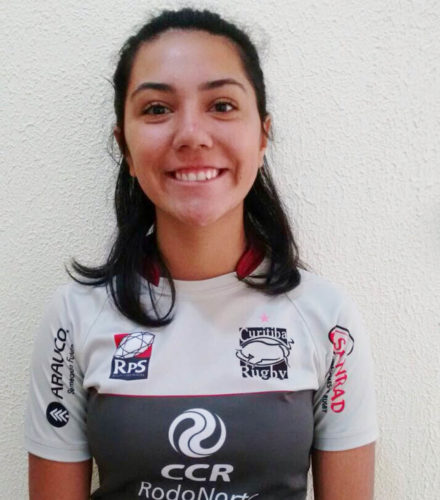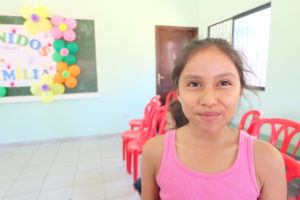Brazil is the fifth-largest country in the world – both geographically and in terms of population. It is truly massive, sharing borders with every other country in South America except for Ecuador and Chile. The Amazon rainforest, recognized for having the greatest biological diversity on the planet, sprawls over the country’s northern half, with rugged mountains to the south.
Despite its wealth of natural resources and beauty, however, Brazil suffers from staggering poverty, rising inflation, unemployment, and a lack of social development. More recently, due to a conflict between the truckers’ union and the government over high gas prices, a truckers’ strike has created transportation issues throughout the country, which has caused school closures. During these trying circumstances, Children Incorporated continues to help support children living in poverty in Brazil so that they may have better opportunities in life – all thanks to our sponsors and donors.
The center comprises homes where children reside with foster parents who support them in overcoming the adversity they faced in abusive households, so that they may have a safe and healthy childhood.
Fostering kids in need
Children Incorporated is affiliated with five projects in Brazil. Casas Lares – ACRIDAS, the CADI center, and the Recanto Esperanza Center are all located in the capital city of Curitiba in Parana; and projects Irmandade Nossa Senhora Das Gracas and the CARITAS – Novo Milenio Center are about seven hours south of there, in the city of Lages. On a recent trip to Brazil, our International Projects Specialist, Andreia Beraldo, traveled to Curitiba, a sprawling city just south of Sao Paulo, where she visited our affiliated project Casas Lares – ACRIDAS. While there, she met not only with our volunteer coordinators at the project, but also with our sponsored children and the foster parents who care for them.
Casas Lares – ACRIDAS was established after a non-profit organization of business and civic leaders, ACRIDAS (the Christian Association of Social Assistance), witnessed the plight of poor children living in the slum neighborhoods in Curitiba, and decided to take action. They established several orphanages to assist these deserving young people, including Casas Lares – ACRIDAS.
Many children who are placed at Casas Lares – ACRIDAS are there by court order, to protect them from the threats of abuse, drugs, violence, and malnutrition that they faced while living with their biological parents. The center comprises homes where children reside with foster parents who support them in overcoming the adversity they faced in abusive households, so that they may have a safe and healthy childhood; and all the while, the center provides the kids with additional support.
The foster homes at Casas Lares – ACRIDAS are clustered around the center, which has served between 48 and 62 children at a time, from birth to twelve years old. Casas Lares – ACRIDAS utilizes monthly sponsorship funds from Children Incorporated to purchase school supplies, clothes, shoes, food, and hygiene items for the children there. Thanks to their sponsors, these kids have the resources they need to attend school so that they can learn and become healthy adults.

The kids are able to run and play with each other at the home.
Our Volunteer Coordinators Rodinéia and Angela showed Andreia around the well-maintained two-story building, which was constructed a few years ago thanks to contributions from Children Incorporated donors. Casas Lares – ACRIDAS was originally intended to be a nursery for the younger infants; but as a result of changes to Brazilian law, the number of infants at the home has decreased, as they are now typically placed at individual foster homes not affiliated with this project. Today, a portion of the building is still being used as a nursery for the youngest children, while an industrial kitchen and several administrative offices occupy the rest.
Helping children cope
During her visit, Andreia was given the opportunity to have lunch with some of our sponsored and unsponsored children, and to meet their foster mothers. Rodinéia and Angela shared stories with her about the children, explaining the reasons for which they had been placed at Casas Lares – ACRIDAS. They talked about how all of the children had suffered extreme violence and trauma in their young lives; many of them have seen and experienced severe cruelty.
Thankfully, however, the kids are able to run and play with each other at the home, where they are given a chance to forget about the traumatizing events they have witnessed in their lives. Andreia noticed that some of the children were more reserved than others on the playground; but they all seemed to be enjoying themselves, thanks to the care they receive from our coordinators and their foster parents at Casas Lares – ACRIDAS.
Andreia learned from her visit that the current primary need of the children beyond the regular support they receive from sponsorship is psychological monitoring. Rodinéia shared that 100 percent of the children there need continuous psychological therapy to help them process the trauma they have lived through, and to support their healthy growth. The children receive free health care from the government, but there is always a long wait to be seen by a public psychologist.
A large number of the children are left without psychological monitoring, which is essential for children with such distressing backgrounds. With additional help, these children, who have already dealt with much hardship in their lives, will not only have the opportunity to grow up in a loving environment, but will also hopefully be able to overcome the adversity they have faced at such young ages.
***
HOW DO I SPONSOR A CHILD IN BRAZIL?
You can sponsor a child in Brazil in one of three ways: call our office at 1-800-538-5381 and speak with one of our staff members; email us at sponsorship@children-inc.org; or go online to our donation portal, create an account, and search for a child in Brazil that is available for sponsorship.


